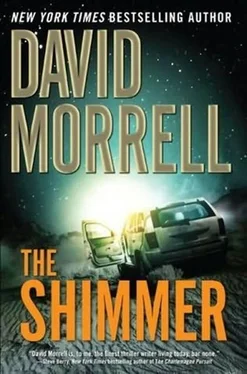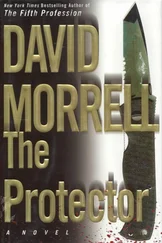Raleigh chose his next words with care. “In addition, there were what might be called difficulties in conducting the research here.”
Difficulties, indeed.
Raleigh looked around the subterranean chamber. Even after all these years, rust-colored smears were visible on the walls, but they had nothing to do with rust.
“With the end of the war, there was no longer any need to train massive numbers of military flight teams, and the cover story lost its effectiveness. So for a number of reasons, the airfield was shut down. Except for this underground facility, the base was allowed to deteriorate. This area wasn’t exposed to the elements, however, and apart from minor water damage, it adjusted extremely well to remaining in hibernation. Indeed, from time to time, it received maintenance checks in case its mission should ever be reactivated. Fifteen years ago, I did exactly that.
“I reactivated it.”
“Anita, are you sure this angle will work?”
Brent raised his voice so that he could be heard above the noisy crowd. He and his camerawoman stood on top of a Winnebago motor home that the owner-a local car dealer-had agreed to let them use in exchange for free publicity.
Like Brent, Anita had gotten only a few hours of sleep since coming to Rostov. There’d been too many people to interview, too many locations to scout. Her eyes looked heavy under her baseball cap. Her outdoor clothes, with their numerous pockets, seemed even more baggy than when they’d started.
My suit looks worse, Brent thought. A day earlier, that would have depressed him, but now-as he peered down at his scuffed, dusty shoes-he almost smiled at the new image he was creating for himself.
“You’ll be on the right side of the screen,” Anita answered. “The horizon’ll be on your left.” She looked so tired, he wondered how she had the strength to keep the heavy camera balanced on her shoulder. “It’s a clear shot. If we tried this on the ground, the crowd would get in the way, but from high up like this, they won’t be in the shot at all unless you ask me to tilt down.”
“Perfect. Stay focused on me unless I indicate otherwise. Tell Jack and the guy in the chopper to keep their cameras panning across the crowd the entire time, just in case something happens.”
“In case what happens?”
“Just make sure they’re ready. And I definitely want a shot of that guy.” Brent pointed down toward a tall, gray-bearded man who wore a biblical robe, held a staff, and looked like Charlton Heston playing Moses in The Ten Commandments.
He frowned toward the east, where the dark clouds were getting thicker. That rain better wait until I finish the broadcast, he thought.
“Okay, time to prep a guest.”
“Button your shirt. Straighten your tie,” Anita advised.
“No way.” Brent rubbed his bristly whisker shadow. “I want CNN to see how hard I’m working.”
“How hard we’re all working.”
“Right.”
At dawn, after a night of chasing interviews, Brent had experienced a moment of powerful inspiration when he’d seen his reflection in a car window and cringed at how terrible he looked. He’d been reminded of an old black-and-white movie about a reporter racing against the clock to prove the innocence of a prisoner about to be electrocuted on Death Row. In the movie, the reporter barely had time to eat, let alone change clothes and shave. At the end of the movie, when he burst into the governor’s office with the proof, he looked like he’d suffered through hell to get the story.
At that moment, the idea had hit him: How can the viewers, or the CNN brass, know how hard I’m working if I make it look easy? I’ve been doing this wrong. What viewer gives a shit if I’m wearing a perfectly pressed suit? Most of them don’t even own a sports coat. For them, wearing jeans is dressing up.
I’ve got to make them realize that I’m one of them-that I’m killing myself to get the story for them.
And with that epiphany, he had done a complete about-face.
In addition to exhaustion, Brent suffered from too much coffee and not enough real food. Doughnuts and tacos had been just about all he’d eaten, always on the go. Except for when he drove with Anita, he never had a chance to sit down, and even then, he wasn’t resting. He was making hurried notes or using his cell phone-which wasn’t easy since the reception here was for shit.
He couldn’t let up. He needed to make sure he got to anybody who might have even the slightest information to contribute, and he had to get there before the other reporters. He wanted everyone else feeling behind the curve, certain that anything they did would look like an imitation of what he’d already accomplished.
But there was a cost. His stomach had a sharp, burning sensation. His hands had a slight tremor. He felt light-headed from exhaustion and lack of food.
Legs stiff, he climbed down the ladder to the crowd below. The noise of so many impatient conversations gave him a headache. The day light was gone now, and the sky was black and starless, but there were plenty of other sources of illumination: headlights, spotlights set up by the authorities and the television crews, flashlights carried by the curious. Brightly lit figures cast stark shadows, lending the scene a surreal quality.
His coanchor, Sharon, waited for him at the bottom of the ladder, her big hair sprayed perfectly into place. Anger made her more beautiful.
“Well, I’ve got to give you credit,” she said crisply. “You finally got what you wanted-you really screwed me today.”
“Was it as good for you as it was for me?”
Someone bumped against them, shoving through the crowd.
“Keep going,” a woman urged her male companion. “We can’t see anything from back here. Get close to the fence.”
“I was supposed to be the one giving the reports to CNN,” Sharon complained. “I was supposed to anchor today’s broadcasts, all by myself.”
“Well, while you were nursing your sore feet, I was out doing the interviews.”
Someone else bumped against them, almost knocking them together.
“If you ask me, these lights are all a bunch of bullshit,” a man complained to his companion. “I don’t know why I let you talk me into coming here. It took six hours, for Christ’s sake. If I’d known there’d be this many people…”
Brent faced Sharon again. “Maybe you should try being a reporter for a change. Dig up more stories about rescued cats and the people who love them.”
A man pushed a woman in a wheelchair, nearly knocking Brent off his feet and shouting, “Out of the way! Let us through. My wife needs to see the lights! They’ll heal her legs! Out of the way…”
Brent took advantage of the interruption and turned toward the broadcast truck, which was parked near the Winnebago.
“Mr. Hamilton,” he called to someone inside the truck. “We’re ready for your interview.”
An uneasy-looking man stepped out. Overweight, in his midforties, he wore cowboy boots and jeans with creases down the middle of the legs. His blue-checked shirt had shiny metal snaps instead of buttons.
“I was on the Highway of Death in the First Gulf War, but nothing ever made me nervous like this.” Hamilton’s puffy cheeks were flushed. He grinned at his own candor.
“Going on television? I thought car dealers were used to that be- cause of their television commercials,” Brent said as he adjusted the tiny microphone clipped to the man’s shirt.
“There’s no station in Rostov. Hell, I’ve never seen the inside of one.”
“Don’t worry about it. I’ll ask you some easy questions about what you told me this afternoon. I’ve never heard anything more fascinating. All you need to do is forget the camera and talk to me the way you’d talk to a customer.”
Читать дальше












